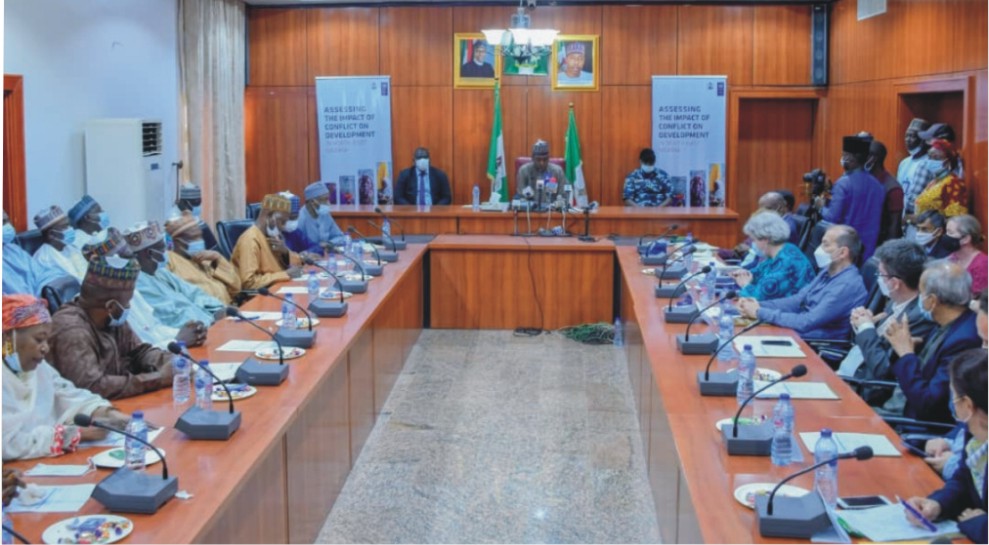Business
World Bank Downgrades Nigeria’s Growth Prospect

The World Bank says Nigeria’s economic growth projection for 2023 has dropped from its previous 3.1 per cent to 2.9.
It explained that this is due to production challenges in the oil sector, rising insecurity, and flooding.
The bank explained in its latest ‘Global Economics Prospects’ Report that, “In Nigeria, growth is projected to decelerate to 2.9 per cent in 2023 and remain at that pace in 2024 barely above population growth.
“A growth momentum in the non-oil sector is likely to be restrained by continued weakness in the oil sector. Existing production and security challenges and a moderation in oil prices are expected to hinder a recovery in oil output.
“Policy uncertainty, sustained high inflation, and rising incidence of violence are anticipated to temper growth. Growth in agriculture is expected to soften because of the damage from last year’s floods.
“As fiscal position is expected to remain weak because of high borrowing costs, lower energy prices, a sluggish growth of oil production, and subdued activity in the non-oil sectors.”
The apex bank also said a sharp, long-lasting slowdown was expected to hit developing countries hard this year as the global economy weakens.
According to the bank, the 2023 global growth is expected to slow to 1.7 per cent — a downgrade from three per cent earlier projected in June 2022.
It, therefore, warned that shocks, including higher-than-expected inflation, and sudden spikes in interest rates to contain price increases, or a pandemic resurgence could tip the global economy into a recession.
“Given fragile economic conditions, any new adverse development — such as higher-than-expected inflation, abrupt rises in interest rates to contain it, a resurgence of the COVID-19 pandemic, or escalating geopolitical tensions — could push the global economy into a recession,” the report stated.
“This would mark the first time in more than 80 years that two global recessions have occurred within the same decade.
“The global economy is projected to grow by 1.7 per cent in 2023 and 2.7 per cent in 2024. The sharp downturn in growth is expected to be widespread, with forecasts in 2023 revised down for 95 percent of advanced economies and nearly 70 per cent of emerging market and developing economies.”
For Sub-Saharan Africa (SSA), the region which accounts for about 60 per cent of the world’s extreme poor, the bank said growth in per capita income over 2023-24 is expected to average just 1.2 percent, a rate that could cause poverty rates to rise.
Business
NCAA Certifies Elin Group Aircraft Maintenance

Business
SMEDAN, CAC Move To Ease Business Registration, Target 250,000 MSMEs

Business
Blue Economy: Minister Seeks Lifeline In Blue Bond Amid Budget Squeeze

Ministry of Marine and Blue Economy is seeking new funding to implement its ambitious 10-year policy, with officials acknowledging that public funding is insufficient for the scale of transformation envisioned.
Adegboyega Oyetola, said finance is the “lever that will attract long-term and progressive capital critical” and determine whether the ministry’s goals take off.
“Resources we currently receive from the national budget are grossly inadequate compared to the enormous responsibility before the ministry and sector,” he warned.
He described public funding not as charity but as “seed capital” that would unlock private investment adding that without it, Nigeria risks falling behind its neighbours while billions of naira continue to leak abroad through freight payments on foreign vessels.
He said “We have N24.6 trillion in pension assets, with 5 percent set aside for sustainability, including blue and green bonds,” he told stakeholders. “Each time green bonds have been issued, they have been oversubscribed. The money is there. The question is, how do you then get this money?”
The NGX reckons that once incorporated into the national budget, the Debt Management Office could issue the bonds, attracting both domestic pension funds and international investors.
Yet even as officials push for creative financing, Oloruntola stressed that the first step remains legislative.
“Even the most innovative financial tools and private investments require a solid public funding base to thrive.
It would be noted that with government funding inadequate, the ministry and capital market operators see bonds as alternative financing.
-
News4 days ago
Tinubu urges security agencies to apprehend killers of Arise TV Staff ?
-
Sports4 days ago
FIFA U20: Flying Eagles Narrowly Loss to Norway
-
Niger Delta4 days ago
IYC Lauds Police Over Real Estate Agent Killer’s Arrest
-
News4 days ago
Nigeria At 65: NOA urges citizens to foster unity, progress
-
Sports4 days ago
Umuahia Hosts Africa Para- Badminton Championship
-
Niger Delta4 days ago
GoG Crucial To Bayelsa’s Dev, Growth – Diri
-
News4 days ago
FG begins payment of N32,000 pension increment to retirees – PTAD
-
Sports4 days ago
CAFCL: Finidi Laud Players Over Impressive Performance

